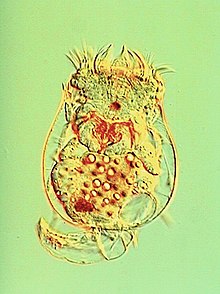Brachionus
| Brachionus | |
|---|---|
 |
|
| Brachionus calyciflorus | |
| Scientific classification | |
| Kingdom: | Animalia |
| Phylum: | Rotifera |
| Class: | Monogononta |
| Order: | Plioma |
| Family: | Brachionidae |
| Genus: |
Brachionus Pallas, 1766 |
| Species | |
|
about 30 |
|
about 30
Brachionus is a genus of planktonic rotifers occurring in freshwater, alkaline and brackish water.
e.g.
Rotifers such as Brachionus calyciflorus are favored test animals in aquatic toxicology because of their sensitivity to most toxicants. They also are used as model organisms in various other biological fields e.g. due to their interesting reproductive mode in evolutionary ecology. Brachionus spp. are easily reared in large numbers and because of this are used to substitute for wild zooplankton for feeding hatchery reared larval fish. However, the composition of rotifers generally does not satisfy the nutritional requirements of fish larvae, and large amounts of research have been invested in improving the lipid, vitamin and mineral composition of rotifers to better meet the requirements of fish larvae
Brachionus species can normally reproduce sexually and asexually (cyclical parthenogenesis). Sexual reproduction (termed Mixis) is usually induced when population density increases. Mixis in Brachionus plicatilis has been shown to be induced by a density-dependent chemical cue.
Transitions to obligate parthenogenesis have been described in Brachionus calyciflorus. In this species, obligate parthenogenesis can be inherited by a recessive allele, which leads to loss of sexual reproduction in homozygous offspring.
Haploid '1C' genome sizes in Brachionus species range at least from 0.056 to 0.416 pg.
The complete mitochondrial genome of B. plicatilis sensu strictu NH1L has been sequenced.
Brachionus plicatilis has been demonstrated to be a large cryptic species complex consisting of several different species. It has a worldwide diversity of at least 14 - 22 cryptic taxa.
Brachionus calyciflorus also seems to be a cryptic species complex.
Huang, L. "Effectof Aldrin on Life History Characteristics of Rotifer Brachionus calyciflorus Pallas." Bull Environ Contam Toxicol no5 N 2007
...
Wikipedia
